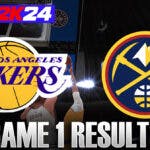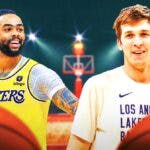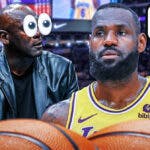Kobe Bryant's career needs no embellishment. Few players in league history can match his level of both team and individual success. His unadulterated force of will on the court and in the locker room made him an archetype of a fading era that's long since passed. He's arguably the most popular player of the league's most accomplished and most glamorous franchise. There's debate as to where he ranks in the league's all-time individual hierarchy, but no denying he belongs in the conversation as one of the greatest players ever.
None of that, though, means Bryant was ever the best player in the world.
The five championship rings, 33,643 career points, and countless moments of crunch-time heroics spanning the better part of two decades speak for themselves. His influence on the league during a time it was searching for identity in the post-Michael Jordan era might be his most significant achievement. With every left-shoulder fadeaway, acrobatic aerial finish, and jaw-dropping instance of real-time ingenuity, Bryant made an entire generation of basketball fans expect the impossible to be proven differently – an expectation they had been told to expect in wake of Jordan calling it quits.
It's his singular style of play and the sense of imminent doom he sparked in opponents that contributed to Bryant's assumed status as the best player in the world even more than his trophies and other accolades. A closer examination of his career timeline, in fact, lends credence to the notion those championships aren't exactly a ringing endorsement of that forgone conclusion.
Shaquille O'Neal was the driving force behind the Los Angeles Lakers' three-peat at the top of the millennium. Bryant was indispensable, even at times the Lakers' most valuable player, on the game's biggest and brightest stage. But there's a reason why O'Neal was crowned Finals MVP for each of Los Angeles' titles: He was the best player in the world during that timeframe, and it wasn't particularly close.
Bryant's fourth and fifth championships came after LeBron James had staked his claim at the top of the league's pecking order. James, at the peak of his physical prime, won back-to-back MVPs in 2009 and 2010, dominating on both sides of the ball in an all-encompassing manner Bryant never could.
The most useful direct comparison between them is how both fared against the Boston Celtics in the 2010 postseason: James averaged 26.8 points, 9.3 rebounds, 7.2 assists, 2.2 steals, and 1.3 blocks per game on 55.6 percent true shooting over a six-game loss in the Eastern Conference Finals; Bryant went for 28.6 points, 8.0 rebounds, 3.9 assists, and 2.1 steals on 52.8 percent true shooting in a dramatic NBA Finals triumph that Doc Rivers still believes would have ended differently had an injured Kendrick Perkins been healthy enough to play in Game 7. Reminder: James' top teammates were Mo Williams, Delonte West, 33-year-old Antawn James, and an aging, out-of-shape O'Neal, while Bryant was flanked by Pau Gasol, Lamar Odom, Metta World Peace, and a young Andrew Bynum.
The Bryant legend also grew out of his failure to lead the Lakers to success in between his runs to consecutive championships. Before James Harden put together one of the most scintillating scoring stretches ever back in January, Bryant's string of nine straight games with at least 40 points in February 2003 didn't have a single modern-day analog. Neither did his historic 2005-06 campaign, when he averaged a ridiculous 35.4 points per game with a supporting cast that included the likes of Smush Parker and Kwame Brown.
Los Angeles' relative struggles in the mid-2000s aren't quite a damning indictment of Bryant. It's unclear how many players throughout NBA annals would have been able to push those rosters to even semi-contention in a stacked Western Conference. But unlike Harden's boundary-breaking usage of the past two seasons, Bryant's never lifted the Lakers offense toward the very top of the league. They finished eighth in offensive rating in 2005-06, and seventh in each season on either side of O'Neal's departure and Gasol's arrival.
Context of Los Angeles failing to maximize Bryant's ability with the type of role players necessary for him to thrive unencumbered obviously factors in here, and so does the evolution of offense altogether. Just imagine how much more dangerous Bryant would have been in his prime if he was constantly surrounded by three capable long-range shooters and a high-flying, rim-running big man. What's impossible to say for certain is whether he would have more frequently embraced the natural playmaking talent he otherwise only flashed during times of need or a desire to prove he was much more than just a scorer.
Kevin Garnett was the game's greatest player in 2003-04 anyway, reaching a pinnacle of two-way impact during his MVP season that was long only reserved for big men. Tim Duncan got there throughout the early-to-mid 2000s, too, albeit in a more understated manner due to both his deliberate playing style and the San Antonio Spurs egalitarian approach to success. Dwyane Wade, at just 24-years-old, was more dynamic during the 2006 Finals than Bryant was in any of his seven total series with the Larry O'Brien Trophy on the line.
The strongest argument for Bryant as the best player in the world comes in 2007-08, shortly after Los Angeles was easily dispatched by the Phoenix Suns in the first round of the playoffs and he requested a trade. The Lakers' acquisition of Gasol at the trade deadline changed everything, propelling them to instant and lasting championship contention. But Bryant and company fell to the Celtics – a team that had been pushed to the seven-game distance in the first two rounds of the playoffs – in six games, and he shot just 40.5 percent from the field, occasionally being outplayed by both Finals MVP Paul Pierce and longtime rival Ray Allen.
An objective look back on Bryant's career makes it clear that he never had an indisputable case as the game's best player.
He wasn't ready during Los Angeles' three-peat, when O'Neal was something close to untouchable. Garnett and Duncan were in his way after that, Wade's rise was meteoric and short-lived, while Steve Nash deserves a passing mention for thrusting the Phoenix Suns to the type of offensive supremacy Bryant couldn't with the Lakers. By the time he got the reinforcements needed to make Los Angeles an annual contender again, James was powering toward an eventual peak that had left him without an equal even before he finally got there with the Miami Heat.
Bryant's sustained excellence has always been a better indicator of the legacy he truly deserves more than any single season performance. It does an unnecessary disservice to one of the best players of all time to suggest otherwise. Not every all-time great can hold the title of the world's best player, and certainly doesn't need to for their career to be canonized appropriately. The sooner unabashed defenders of Bryant's legacy admit that reality, the sooner a more constructive discussion can be had about where he ranks among not just the best players ever, but the Hall-of-Fame peers who took that mantle from him.




